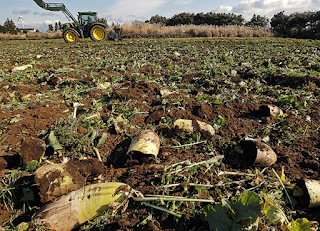Jeju Daikon Radish Farmers Face Crisis: Voluntary Cutbacks to Address Price Plunge
The article highlights the crisis faced by Jeju Daikon radish farmers in South Korea, particularly on Jeju Island. Farmers are resorting to voluntary cutbacks, plowing their fields, and sacrificing their harvest due to a sharp decline in radish prices. Despite their efforts, the economic struggle is evident as farmers find it challenging to cover production costs.
Plight of Jeju Daikon Radish Farmers:
- Farmers, including Kim Byung-man from Seogwipo-si, Jeju-do, express distress over the unstable and low prices of Daikon radishes. The article emphasizes the emotional and financial toll on farmers as they witness their fields turned into mounds of crushed radishes and dirt.
Government and Farmers' Measures:
- The Jeju Daikon Radish Producers' Council, along with the government and agricultural cooperatives, took measures to address the crisis. They joined quarantine efforts covering 1,200 hectares of radish fields, with farmers voluntarily pledging not to ship non-commodity radishes. However, farmers stress the necessity of stronger supply and demand measures from the government.
Radish Price Situation:
- Radish auction prices at Seoul's Garak Market, as of the 14th, remained significantly lower than the previous year, with concerns of further price drops when winter radish shipments intensify. The average price for 18 kilograms of radishes was reported at 10,000 to 11,000 won, compared to the previous year's average of 16,000 won.
Voluntary Cutbacks and Challenges:
- Facing financial struggles, farmers resort to voluntary cutbacks, plowing their fields to cope with plummeting radish prices. The article notes the difficulty in supporting radish prices even with replacements and underscores the need for fundamental measures to prevent recurring agricultural product waste.
Jeju Island's Winter Daikon Planting Area:
- The latest drone observation indicates a winter Daikon planting area of 5,910 hectares in Jeju Island, a slight decrease from the previous year. However, fears of overproduction persist due to favorable crop conditions, leading to voluntary reductions in shipments by more than 140 farmers.
Economic Impact and Future Outlook:
- The economic impact is evident as farmers, despite their efforts, struggle to cover production costs. Voluntary cutbacks, like those in Waldongmu, cover 181 hectares, amounting to 4.8 billion won. The article warns of a potential vicious cycle of declining prices and abandonment unless extraordinary measures are taken to stabilize prices.
Conclusion: The article sheds light on the challenging situation faced by Jeju Daikon radish farmers, prompting voluntary cutbacks due to a sharp decline in prices. Despite collaborative efforts, the economic strain on farmers and concerns about overproduction emphasize the need for comprehensive and long-term solutions to address the recurring crisis in the agricultural sector.
Discover the challenges gripping Jeju Daikon radish farmers as they face a severe crisis with plummeting prices. Despite collaborative efforts, farmers resort to voluntary cutbacks, plowing their fields, and sacrificing their harvest. The article delves into the emotional and financial toll on farmers, emphasizing the need for robust government measures to stabilize prices and prevent recurring agricultural waste.
#AgriculturalCrisis, #JejuRadishFarmers, #PricePlunge, #VoluntaryCutbacks, #FarmersStruggle, #AgriculturalWaste

